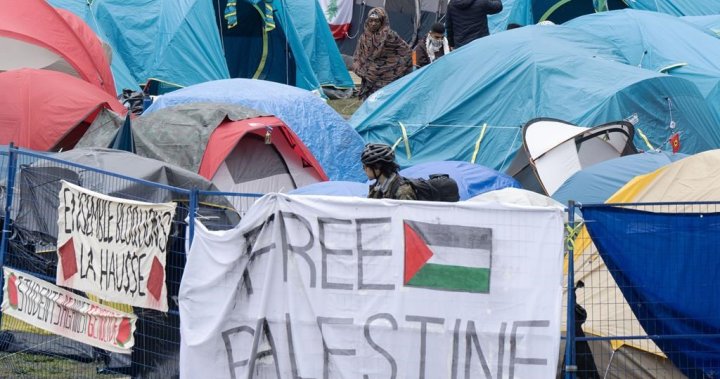McGill University in Montreal is seeking a court order to dismantle a pro-Palestinian encampment on campus, despite ongoing talks with the campers to reach a peaceful resolution. The protest, which began on April 27, is part of a wave of similar demonstrations on campuses across the United States calling for divestment from Israel-connected funds. McGill president Deep Saini stated that the university is committed to continuing discussions with encampment participants, even if the court order is granted. He warned that Montreal police would be authorized to execute the order.
Multiple reasons were cited for wanting the encampment gone, including health and safety hazards. Concerns included the lack of escape routes in case of fire, the densely populated nature of the camp, and the obstruction of an emergency exit at the McLennan Library. The university also mentioned an escalation of tension on campus following protests and counter-protests, which required the mobilization of over 100 police officers and the closure of part of Sherbrooke Street. Saini reiterated that the university is private property and primarily for the use and benefit of the McGill community, noting that the encampment could prevent spring convocation ceremonies.
Activists quickly condemned McGill University’s decision to seek an injunction to dismantle the encampment, calling it a “shameful move.” SPHR McGill, the organizers of the protest, refuted claims that the university was negotiating in good faith. They pointed out that an earlier injunction by the court had been rejected, recognizing the protest as peaceful. Additionally, representatives from the SPVM confirmed that activities within the encampment did not violate any laws, thus negating the need for police action. The activists were set to hold a press conference to address the situation further.
The encampment on McGill University’s campus has been a point of contention, with both sides holding firm in their positions. The university is focused on safety concerns, citing potential hazards and the disruption of campus activities. Meanwhile, the activists are adamant about their right to protest peacefully and have criticized the university for seeking legal action to remove them. The situation highlights the ongoing debate around the Israeli-Palestinian conflict and the role of universities in addressing divestment and social justice issues.
As negotiations continue between McGill University and the encampment participants, the outcome remains uncertain. The university’s decision to seek a court order indicates a desire to maintain safety and order on campus, while the activists are determined to stand their ground and continue their protest. The escalating tensions and conflicting perspectives underscore the complexities of addressing politically charged issues on university campuses. All parties involved are likely to continue advocating for their beliefs and working towards a resolution that aligns with their respective goals and values.
Moving forward, it will be crucial for McGill University and the encampment participants to find a way to peacefully resolve their differences and reach a compromise that ensures the safety and well-being of all individuals on campus. The ongoing discussions and potential legal actions highlight the challenges of balancing free speech rights with maintaining a secure and inclusive campus environment. As the situation unfolds, it remains to be seen how McGill University and the activists will navigate the complexities of the protest, the court order, and the broader implications for campus safety and social justice issues.


